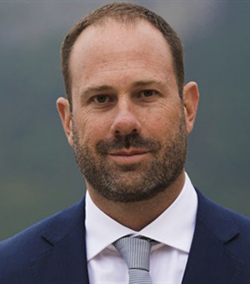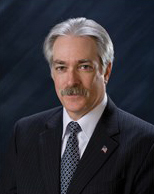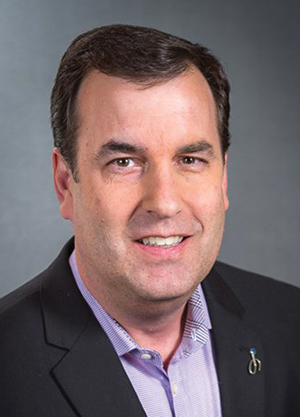- Details
- Category: Industry News
 REV Group Vice President of Sales Matt Scheuler
Milwaukee, Wis. — REV Group, a manufacturer of specialty vehicle brands and provider of parts and services, has announced that Matt Scheuler has been named vice president of sales. Scheuler will lead all sales and strategic planning across REV bus companies based in Salina, Kan.; South Hutchinson, Kan.; and Imlay City, Mich. He will be reporting directly to Ian Walsh, COO of REV Group.
REV Group Vice President of Sales Matt Scheuler
Milwaukee, Wis. — REV Group, a manufacturer of specialty vehicle brands and provider of parts and services, has announced that Matt Scheuler has been named vice president of sales. Scheuler will lead all sales and strategic planning across REV bus companies based in Salina, Kan.; South Hutchinson, Kan.; and Imlay City, Mich. He will be reporting directly to Ian Walsh, COO of REV Group.
“I’m thrilled to have Matt Scheuler leading the sales and strategic efforts across our bus division. Matt has demonstrated excellent leadership and results as the vice president and general manager of Collins Bus the last 5 years,” commented Walsh. “Matt has a strong skill set for process excellence needed to win in our marketplace and has built lasting and enduring relationships with our dealers and customers.”
“I’m excited for the opportunity to work with Ian and our leadership teams at each of our business units. After spending several years leading our school bus company, I’m looking forward to working across the other bus companies and aligning our strategic efforts,” added Scheuler. “REV has an excellent portfolio of products, strong leadership, and an exceptional distribution channel, which are key components to our overall success now and into the future.”
Scheuler’s responsibilities will cover REV shuttle and school bus which is comprised of some of the industry’s leading brands—Champion Bus, Collins Bus, ElDorado National-Kansas, Federal Coach, Goshen Coach, World Trans, and Krystal—that manufacture light and medium-duty commercial buses for public transit, paratransit, airport, parking, hotel/resort, group tour, assisted living, church, university transportation, and school bus markets.
Visit revgroup.com for more information.
[CD0419]
- Details
- Category: Industry News
 NELA President Rick Szilagy Boston — The New England Livery Association (NELA) received word at the end of April that during a recent Massport’s Board of Directors Meeting, changes were proposed that would affect TNC operations at Logan Airport.
NELA President Rick Szilagy Boston — The New England Livery Association (NELA) received word at the end of April that during a recent Massport’s Board of Directors Meeting, changes were proposed that would affect TNC operations at Logan Airport.
Massport, or the Massachusetts Port Authority, operates that state’s three airports and the public terminals at the Port of Boston. It put forth proposals that included fee increases and moving TNCs from terminal curbs to the central parking garage. Governor Charlie Baker announced his support of the proposed changes that same week.
At the conclusion of the April 25 board meeting, the fees originally proposed have been modified, as has the movement of TNCs from the curbside; however, the proposed changes would see TNCs paying a new drop-off fee of $3.25. They also include removal of TNC vehicles from the curb except during the hours of 4AM and 10AM, with an effective date of October 2019.
These will be the most significant changes affecting TNCs in the commonwealth of Massachusetts since the successful passage of NELA’s TNC legislation in August of 2016.
NELA’s next events are its June 11 membership meeting and the annual Chauffeur Appreciation Day at Logan Airport June 13.
Visit nelivery.org for more information.
[CD0419]
- Details
- Category: Industry News
 UMA President & CEO Stacy Tetschner Washington, D.C. — More than 80 UMA members met with 150 congressional officers April 3 to educate members of Congress on the vital role private motorcoaches play, emphasizing the way they create jobs, generate tourism dollars and provide a safe, fuel-efficient, and green solution to transportation and travel.
UMA President & CEO Stacy Tetschner Washington, D.C. — More than 80 UMA members met with 150 congressional officers April 3 to educate members of Congress on the vital role private motorcoaches play, emphasizing the way they create jobs, generate tourism dollars and provide a safe, fuel-efficient, and green solution to transportation and travel.
“We work all year long on behalf of the industry but, as hired guns, we can only tell the story so many times. Who they really want to hear from are the people in their district,” said UMA President & CEO Stacy Tetschner, who accompanied members in a supporting role.
The 2019 Bus & Motorcoach Industry Legislative Fly-In included 21 national and regional organizations. UMA operators were supported by representatives from industry suppliers such as ABC Companies, MCI, Prevost, United Bus Technologies, and Temsa, who joined them in the meetings.
With a new Congress in place and new leadership in the House, the event provided an opportunity for operators to speak with a unified voice about the critical need to keep the partial fuel tax exemption for motorcoaches, while laying the seeds for returning to a full exemption, Tetschner noted.
Parity was a key message in advocating that motorcoach operators pay the same amount in taxes that mass transit does. If the government can’t eliminate the collective $65 million the industry pays in partial gas taxes, then mass transit should be asked to pay the same amount.
 As they flowed into the state Capitol in the middle of the annual Cherry Blossom Festival and gathered inside small legislative offices—small state groups meeting with legislators or staff members from their particular districts—UMA members expressed fear the industry could lose that exemption as President Donald Trump and Congress are searching for money to shore up the Highway Trust Fund and fund an infrastructure bill to repair the nation’s deteriorating bridges. When the exemption started out in the 1970s, during the energy crisis, Congress granted motorcoaches a full exemption from the fuel tax, but that has been eroded by subsequent Congresses.
As they flowed into the state Capitol in the middle of the annual Cherry Blossom Festival and gathered inside small legislative offices—small state groups meeting with legislators or staff members from their particular districts—UMA members expressed fear the industry could lose that exemption as President Donald Trump and Congress are searching for money to shore up the Highway Trust Fund and fund an infrastructure bill to repair the nation’s deteriorating bridges. When the exemption started out in the 1970s, during the energy crisis, Congress granted motorcoaches a full exemption from the fuel tax, but that has been eroded by subsequent Congresses.
In their meetings, operators emphasized that motorcoaches shouldn’t be lumped in with the trucking industry on this issue. Lighter buses don’t wear out the roads like big rigs do and are much safer.
This year, there were two upgrades that helped operators be more efficient and effective during the Fly-In. Paperwork was replaced with a new app that guided members around the maze of corridors connecting the House and the Senate offices. It also made it easy to quickly complete surveys after each session. The other upgrade was a glossy, colorful four-page brochure that explained the industry’s impact in easy-to-understand graphics. Members passed those out as they entered meetings.
This was a good year to focus on educating Congress because there weren’t any driving regulatory issues to try to change, says Ken Presley, UMA’s vice president of industry relations and chief operating officer.
“Explaining the size and scope of the industry, who we are and what we do. We had a lot of staffers say, ‘I didn’t realize that is what you did,’” Presley said.
UMA will take the information that came from the meeting debriefs and the reviews to look for opportunities to follow up with congressional members.
Visit uma.org for more information.
[CD0419]

